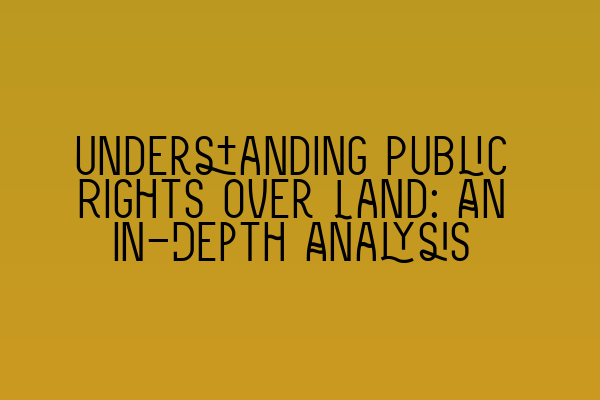Understanding Public Rights over Land: An In-Depth Analysis
Welcome to SQE Property Law & Land Law, where we provide comprehensive legal advice and expert representation in all matters relating to property law. In this blog post, we will delve into the intricacies of understanding public rights over land, providing you with an in-depth analysis of this complex area.
The Concept of Public Rights over Land
Public rights over land refer to the legal entitlements granted to the general public to access and use specific areas of land. These rights can vary in nature and scope depending on the legislative framework of each jurisdiction. It is crucial for property owners, developers, and individuals alike to have a clear understanding of public rights over land to ensure compliance with the law and protect their interests.
Different Types of Public Rights over Land
There are several types of public rights over land that may exist, including:
- Right of Way: Also known as the right to pass and repass, this grants members of the public the legal right to cross over or travel through private land to access another location. Right of way can be established through various means, such as longstanding use, express grant, or statutory provisions. To understand the specific regulations governing right of way in your jurisdiction, it is essential to consult with a qualified property law professional.
- Access to Waterways: In many jurisdictions, individuals have the right to access and use public waterways, such as rivers, lakes, or beaches, for recreational or commercial purposes. These rights may be subject to certain restrictions and regulations, so it is crucial to be aware of the legal framework governing public access to waterways in your area.
- Common Land: Common land refers to areas of land that are owned collectively by a community or shared among multiple individuals. These areas often have specific customary rights attached to them, such as grazing rights or the right to collect firewood. Understanding the rights and obligations associated with common land is vital for property owners and developers to ensure compliance with the law and avoid potential disputes.
Preserving Public Rights over Land
Preserving public rights over land requires a careful balance between the interests of the public and the rights of property owners. Legislation and regulations vary from jurisdiction to jurisdiction, but common methods used to maintain public rights over land include:
- Designating specific areas as public spaces
- Creating public access easements
- Establishing conservation areas or heritage sites
- Implementing zoning laws that protect public access to certain areas
By implementing these measures, governments aim to safeguard public access to land while ensuring that private property rights are respected.
Seeking Professional Guidance
Given the complex and nuanced nature of public rights over land, seeking professional guidance is highly recommended. At SQE Property Law & Land Law, our team of experienced solicitors has a wealth of knowledge in this area and can provide expert advice tailored to your specific situation. To learn more about our services and how we can assist you, please contact us.
Conclusion
Understanding public rights over land is essential for property owners, developers, and individuals interacting with the land. By grasping the various types of public rights, the methods for preserving those rights, and the legal implications surrounding them, you can navigate this complex area of law more effectively. Remember to consult with qualified legal professionals for personalized advice related to your specific circumstances.
For additional resources and information about the SQE exams and preparation, please visit the following links:
- SQE 1 Practice Exam Questions
- SQE 1 Practice Mocks FLK1 FLK2
- SQE 2 Preparation Courses
- SQE 1 Preparation Courses
- SRA SQE Exam Dates
Thank you for reading and remember to stay informed about your rights and responsibilities in the realm of public rights over land.
